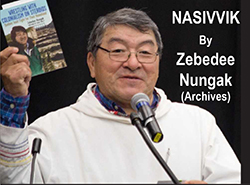
NASIVVIK By Zebedee Nungak,
Windspeaker Columnist; Archives 2006
Nasivvik is an Inuktitut word that means vantage point. It can be a height of land, a hummock of ice, or any place of elevation that affords observers a clear view of their surroundings to make good observations.
Any writer should be eager to get published in any publication. Being published accomplishes two things. First, it earns the writer a bit of money, and I'm being literal when I say "a bit of money". Second, it exposes the writer's style and talent to a wider audience, which is important to any serious writer.
On the other hand, writing can have its share of misadventures.
Early in my writing career, I wrote an article with photographs, which, in my naiveté I thought would blaze my name unto Magazine-dom, if only it were published. The editor of the magazine I submitted it to assured me that my article would appear in their next issue. The issue came and went, but my article did not appear. Two months lapsed between issues, and another issue passed.
This was disappointing, but I did not contact the editor. My mind started wandering, "Who are you, an unknown Eskimo writer wannabe, to bother an important editor of a widely-known magazine to complain about not being published? Be patient and let this thing take its course. Maybe they're waiting for a dry spell, when even your article will look good enough for a cover story. Don't call them. They'll call you!"|
After three more months, I finally had enough of simply waiting around for my article to appear. I called the editor, and told him straight, "Give me back my article and photos, right now. I will peddle it to any number of other magazines."
"Oh, No, No, No! We will run it in the next issue! But you should know that we have every right to run, or not to run, any article submitted to us."
Here, to me, was Lesson No. 1: Editors of publications are absolute masters of their domain. They can be like Chairmen of Politburos in a dictatorship. Arguing with an editor can be futile. It can also be fatal, literarily speaking, for somebody who's just starting out as an aspiring writer. In politics, I used to be something of a Big Man on the Scene. In writing, I was just another schmuck trying to get noticed.
Eventually, my article appeared. My head was almost spinning in the Big Time until it hit Lesson No. 2: One magazine article does not make you a writing Name. You'll have to write countless others, all equally good, before anybody starts to notice.
As my writings became better known, I became a regular contributor in a widely-circulated magazine. The magazine's editors changed every few issues, but I worked comfortably with all of them. It seemed like I had found my niche in Magazine-dom. As time went by, they even gave me an important-sounding title, "Senior Contributor", I think.
Other publications in the magazine world started to notice my writings through this magazine. Before long, I was getting "discovered" just enough to get those literal "little bits of money" coming in from occasional reprints of my writings in other magazines. My writings were gaining a wider audience, and I no longer had to beg politely to get published.
Then, one day, a new editor called me, and asserted to me, in that Politburo Chairman sort of way, that I would now be writing 750 word articles once every fourth issue. Editors have a way of being vividly switched on, and acting tough-as-nails. So, I let two days pass before calling up to ask just what this all meant. My conversation with the new editor confirmed that they wanted to see me less frequently, and in reduced portions, in their publication.
I would continue to retain my important-sounding title with the magazine, while churning out fewer words in articles, which would appear once every Blue Moon. I asked myself, "Should I grovel to be in a magazine under such conditions?" My instinct, which has carried me through much tougher challenges, told me, "NO!" So I told the editor, "Sorry! I can't continue under these terms." And I said Good-bye to the editor, and to the publication.
As I get further into writing, I've perceived that some stories resemble paintings, which can be appreciated only in the right-sized frame. A masterpiece of writing cannot really fit into a postage stamp. Sizing down writings into segments that are too small can neutralize their essence and character. It is better not to get published than to compress and contort written work into sizes dictated by magazine editors.
So now, I submit short articles to magazines of my choosing, once every Blue Moon. This may sound exactly like the box that the editor tried to get me into earlier, but there is a difference: I decide what the magazine will get, and when. Magazine editors may still be absolute Bosses of their domain, but not of me.
